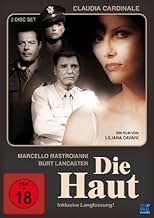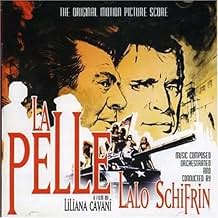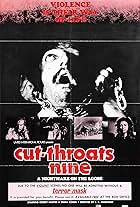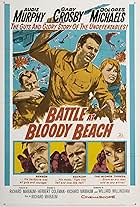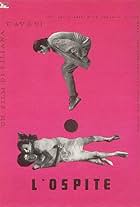IMDb RATING
6.6/10
1.4K
YOUR RATING
After the Allies liberate Naples in 1943, the life for the locals is not much easier, especially for women. Many sacrifice their dignity and morale to survive.After the Allies liberate Naples in 1943, the life for the locals is not much easier, especially for women. Many sacrifice their dignity and morale to survive.After the Allies liberate Naples in 1943, the life for the locals is not much easier, especially for women. Many sacrifice their dignity and morale to survive.
- Awards
- 1 win & 2 nominations total
Peppe Barra
- Sarto
- (as Giuseppe Barra)
Rosaria della Femmina
- Amante di Jimmy
- (as Maria Rosaria Della Femmina)
Featured reviews
This movie is based on the true memoirs of the main character (Curzio Malaparte) during his time when he acted as diplomatic liaison between the Allied forces and the Italian in the newly occupied Italy. The book is a collection of short stories depicting the collapse of the Italian society under Allied occupation. There is no story line between those short stories. The movie puts them in chronological order, but the reigning chaos and lack of moral message (the message is exactly the lack of morality) can confuse the spectator.
This is a very original war movie, in that the main theme is the not the war front. The Allied are not viewed from their own perspective, which is one of true liberators. Instead, the movie shows the Italian people courting the Allies as liberators in order to escape from starvation. The Allies themselves are caught in a trap where they know the Italian hospitality isn't sincere, but are unable to understand why. They don't realize that before them, the Germans were courted as liberators too, and that in this context of food shortage and general poverty, the only way the Italians have to secure their survival is to play that game.
Malaparte (played by Marcello Mastroiani) acts then as a translator, helping the Americans as a guide would help a tourist, by explaining in each situation why people are acting in this seemingly dishonorable way.
La Pelle (The Skin) would make more sense if compared to Malaparte's twin book on the occupied Europe (Kaputt, or Broken to Pieces). In the latter, he portrays the Nazi way of oppressing through violence. In La Pelle, he shows how the Americans achieve a similar result through economic means, while refusing any responsibility. In Kaputt, Jewish women are made prostitutes by the German Army to escape death by the bullet; in La Pelle, Italian women become prostitutes for the American Army to escape death by starvation.
This is a very original war movie, in that the main theme is the not the war front. The Allied are not viewed from their own perspective, which is one of true liberators. Instead, the movie shows the Italian people courting the Allies as liberators in order to escape from starvation. The Allies themselves are caught in a trap where they know the Italian hospitality isn't sincere, but are unable to understand why. They don't realize that before them, the Germans were courted as liberators too, and that in this context of food shortage and general poverty, the only way the Italians have to secure their survival is to play that game.
Malaparte (played by Marcello Mastroiani) acts then as a translator, helping the Americans as a guide would help a tourist, by explaining in each situation why people are acting in this seemingly dishonorable way.
La Pelle (The Skin) would make more sense if compared to Malaparte's twin book on the occupied Europe (Kaputt, or Broken to Pieces). In the latter, he portrays the Nazi way of oppressing through violence. In La Pelle, he shows how the Americans achieve a similar result through economic means, while refusing any responsibility. In Kaputt, Jewish women are made prostitutes by the German Army to escape death by the bullet; in La Pelle, Italian women become prostitutes for the American Army to escape death by starvation.
I have more or less the same feelings toward The Skin as I do towards Liliana Cavani's more well-known The Night Porter. Both movies deal with provocative and uncomfortable sexual themes/situations taking place during World War II. Both are daring and sound fascinating on paper. Both are also weirdly boring, making me feel as though Cavani is a filmmaker who's admirably daring and willing to go to places most other directors won't go, but at the same time, can't really tell a story or make things properly involving.
Much of what The Skin and The Night Porter explores is thought-provoking and boundary-pushing. These are difficult stories that I'm glad have been told, but I just wish they were told better. I was shocked by how boring The Night Porter was, and I'm similarly surprised/disappointed by how dull and poorly paced The Skin was.
I also didn't like how the whole thing was in Italian, even though many scenes involve characters who don't speak the same language interacting and needing translators. It's very odd and distracting to have to remind yourself "I hear Italian right now, but in the film's universe, this character is actually speaking English at the moment, and so the actual Italian characters can't understand him/her."
The Skin succeeds in being thought-provoking and disturbing, but fails elsewhere, as a movie. And it's not that I think it should be "entertaining" in the traditional sense, given the subject matter. I just think it should be more involving and engrossing on a gut level. I can honestly understand why this one wallows in obscurity, despite some things here that are certainly able to be appreciated.
Much of what The Skin and The Night Porter explores is thought-provoking and boundary-pushing. These are difficult stories that I'm glad have been told, but I just wish they were told better. I was shocked by how boring The Night Porter was, and I'm similarly surprised/disappointed by how dull and poorly paced The Skin was.
I also didn't like how the whole thing was in Italian, even though many scenes involve characters who don't speak the same language interacting and needing translators. It's very odd and distracting to have to remind yourself "I hear Italian right now, but in the film's universe, this character is actually speaking English at the moment, and so the actual Italian characters can't understand him/her."
The Skin succeeds in being thought-provoking and disturbing, but fails elsewhere, as a movie. And it's not that I think it should be "entertaining" in the traditional sense, given the subject matter. I just think it should be more involving and engrossing on a gut level. I can honestly understand why this one wallows in obscurity, despite some things here that are certainly able to be appreciated.
10rgm234
This movie tells an historic story, and begins with a somewhat arty slant. But it gradually becomes a dadaist study in human depravity and thinly veiled injustice in terrible times. Though set in WWII, it is not a war movie. It probes deeply and uncomfortably into moral issues rarely discussed in war movies. For this reason it is extremely compelling.
The plot line is not direct, and the characters often confusing, but that is it's goal to be a moving piece of cinematic art. The film develops into a Felliniesque dream where logic and a pleasant, easy, normal straightforward narrative dissolve into a a gaudy abstract symbolism that will require a second viewing to figure out. This film is on the level of Bergman, Fellini, Godard etc. It is a challenging, heartfelt film, not suitable for date night. The direction, camera, acting, editing, sets, wardrobe, casting, are excellent.
I watched this in 2020-- 12 years after it was released on the Criterion Channel. Never had heard of it, but the description sounded interesting. Interesting, the language is Italian with English subtitles, even though many of the characters are American (including Burt Lancaster) who was ironically typecast as the dithering, bullying American general (referring to Buck Turgidson in DR STRANGELOVE).
I couldn't find any professional reviews of this film, or any box office history, so, because of its ambivalent anti-war/anti-Americanism it may never have played theatrically in the US. The Criterion Channel may be the only place you'll find it. But if you love cinema, you'll love this film.
The plot line is not direct, and the characters often confusing, but that is it's goal to be a moving piece of cinematic art. The film develops into a Felliniesque dream where logic and a pleasant, easy, normal straightforward narrative dissolve into a a gaudy abstract symbolism that will require a second viewing to figure out. This film is on the level of Bergman, Fellini, Godard etc. It is a challenging, heartfelt film, not suitable for date night. The direction, camera, acting, editing, sets, wardrobe, casting, are excellent.
I watched this in 2020-- 12 years after it was released on the Criterion Channel. Never had heard of it, but the description sounded interesting. Interesting, the language is Italian with English subtitles, even though many of the characters are American (including Burt Lancaster) who was ironically typecast as the dithering, bullying American general (referring to Buck Turgidson in DR STRANGELOVE).
I couldn't find any professional reviews of this film, or any box office history, so, because of its ambivalent anti-war/anti-Americanism it may never have played theatrically in the US. The Criterion Channel may be the only place you'll find it. But if you love cinema, you'll love this film.
One of my all-time favorite war films. Americans might have trouble with it as it doesn't show us in the best possible light, but it is probably very close to the truth. It demonstrates better than any film I've seen how terrible and dispiriting life can be for a defeated population. Marcello Mastroianni gives another of his trademark world-weary but compassionate performances as the liaison between the American and Italian armies.
As a member of the US Air Force stationed in Naples during the movie I had the opportunity to appear in the film. I think I had 26 appearances in the film, all as a non-speaking extra. I got to know some of the actors, Ken Marshall was a really decent guy, Burt Lancaster (had a photo with him) always took 2 or 3 takes to get it right, Marcello Mastroiani was amazing, he spoke his lines like he was telling a story over dinner, just flawless! Claudia Cardinale was really nice the couple times we talked. It was really an adventure doing the film, there were many hours of just sitting around waiting for something to happen. Months later when the film was released they had two showings at the NATO base. It was a sell out both times and all you could here was everyone (along with me) saying things like: "Hey there I am, That was me, Look look, there I am again"! Someday I would like to see it again so I could hear what it was about. One last thing, the most memorable part of the film for me was when the American tanks (Korean war vintage) went through the town and the Italians all came out and cheered. That scene had to be done twice and then spliced together. Once the director yelled (in Italian) "cut", Bert stood up in his jeep, with his hands on his hips, looked at a now silent cast and proclaimed in his strong voice "In my 35 years of movie making, this is the most f***ed up fiasco I have ever been involved in"! Maybe that made it in the directors cut!
Did you know
- TriviaThe film's editor was Ruggero Mastroianni, Marcello Mastroianni's brother.
- GoofsAt approximately 19 mn into the movie and again at approximately 1h18 mn, Goldberg, the roommate of Jimmy Wren (Ken Marshall), is seen reading an issue of the comic book "Batman". However the cover is clearly shown and is in fact that of issue N°257, published in August 1974, ie 31 years after the events of the movie.
- ConnectionsFeatured in Naples '44 (2016)
- SoundtracksLa Pelle
written by Roberto De Simone
sung by Maria Kelly
recorded on "La Gatta Cenerentola"
published by La voce del padrone; EMI Italiana
- How long is The Skin?Powered by Alexa
Details
- Release date
- Countries of origin
- Official site
- Language
- Also known as
- Koza
- Filming locations
- Casa Malaparte, Isle of Capri, Naples, Campania, Italy(Villa of the main character, Curzio Malaparte)
- Production companies
- See more company credits at IMDbPro
- Runtime2 hours 11 minutes
- Sound mix
Contribute to this page
Suggest an edit or add missing content



